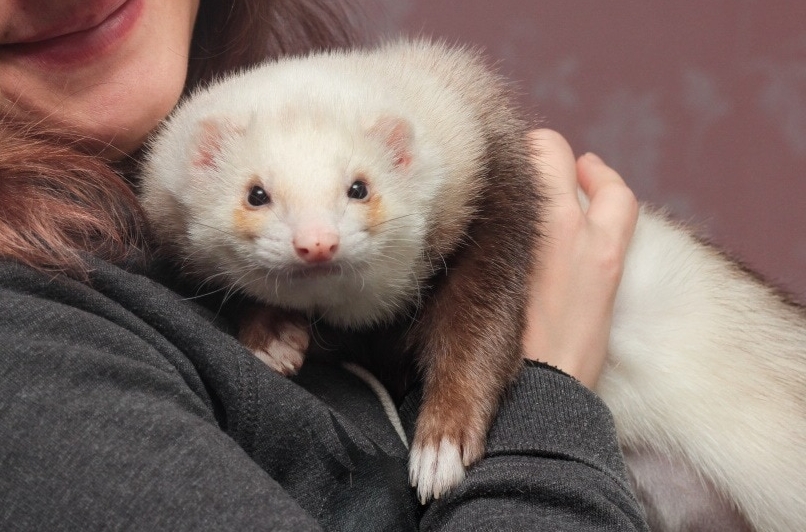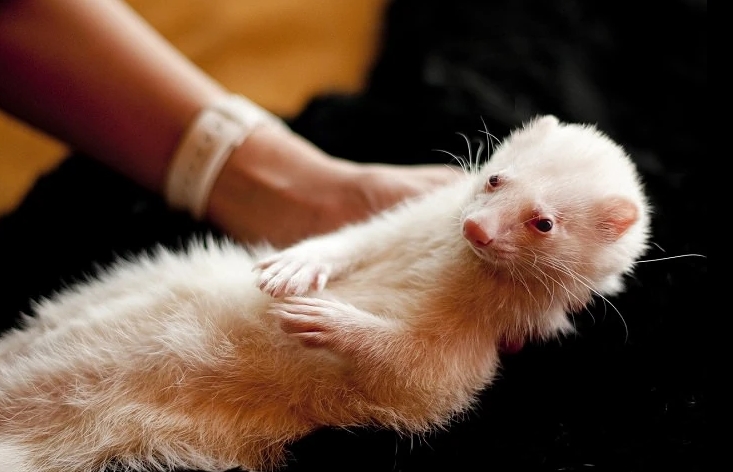Ferrets are cute and playful pets that require a certain level of care and attention. As a first-time ferret owner, it’s important to know the basics of how to take care of a ferret. This article will provide you with seven essential tips to help you keep your furry friend healthy and happy. The first tip is to provide your ferret with a clean and safe living environment, which includes choosing the right cage and setting it up with bedding and toys.
Introduction of How to Take Care of a Ferret
Taking care of a ferret requires a certain level of knowledge and attention. In this article, you will learn some tips on how to do so effectively. Ferrets are small animals that make great pets for some people. They are playful, social creatures that can bring a lot of joy into your life.
Why ferrets make great pets
One of the reasons why ferrets make great pets is that they are playful and fun to watch. They love to explore and play with toys, which can be entertaining for both you and your furry friend. Another reason why ferrets make great pets is that they are social animals that can bond with their owners. They can become very affectionate and enjoy spending time with their human companions. Finally, ferrets are low-maintenance pets that do not require a lot of space, making them a great choice for apartment dwellers or those with limited living space.
What to expect as a first-time ferret owner
As a first-time ferret owner, it’s important to know what to expect. Ferrets require a clean and safe living environment, so you’ll need to provide them with a cage that is big enough for them to move around in. You’ll also need to provide them with food, water, and toys to keep them healthy and entertained. In addition, ferrets need to go to the vet for regular check-ups and vaccinations to ensure that they stay healthy. By being prepared and taking good care of your ferret, you can have a long and happy relationship with your furry friend.
Ferret Housing
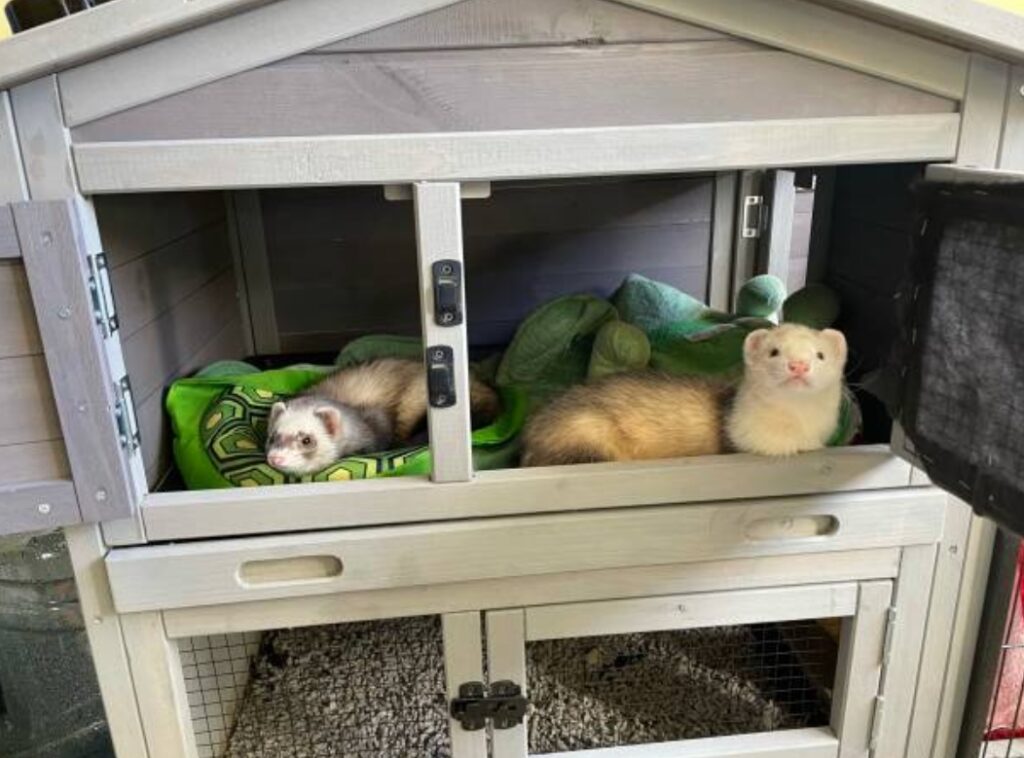
Taking care of a ferret starts with providing them with a clean and safe living environment. This includes choosing the right cage, setting it up properly, and providing them with the necessary bedding and toys.
Choosing the Right Cage:
When choosing a cage for your ferret, make sure it’s big enough for them to move around comfortably. The cage should have multiple levels and be made of sturdy materials, such as metal or plastic. Avoid cages made of wood or other materials that can be chewed through easily.
Ferrets are active animals that need plenty of space to move around, play, and sleep. Look for a cage that is at least 24 inches wide, 24 inches long, and 18 inches high. The cage should also have multiple levels, as ferrets like to climb and explore. Finally, choose a cage with a secure door and locks, as ferrets are known for being skilled escape artists.
Setting up the Cage:
Once you have chosen the right cage, it’s time to set it up. Place the cage in a quiet and draft-free area of your home. Line the bottom of the cage with bedding, such as fleece, which can be easily cleaned and replaced. Provide your ferret with a litter box and food and water bowls.
Providing Bedding and Toys:
Ferrets love to burrow and sleep in cozy places. Provide them with plenty of bedding, such as blankets or hammocks, to make their cage comfortable. Additionally, ferrets are active and playful animals that need plenty of toys to keep them entertained. Toys can include balls, tunnels, and chew toys. Make sure to rotate your ferret’s toys frequently to keep them interested.
Feeding Your Ferret
Proper nutrition is essential for keeping your ferret healthy and happy. Understanding your ferret’s dietary needs, selecting the right food, and establishing a feeding schedule are all important aspects of taking care of your pet.
Understanding a Ferret’s Dietary Needs
Ferrets are obligate carnivores, which means that they need a diet that is high in animal protein and fat. Look for ferret-specific food that is made with high-quality meat sources, such as chicken or lamb, and avoid food that contains plant-based protein, grains, or sugary fillers.
Selecting the Right Food
Choose a ferret food that has at least 32% protein and 18% fat. Make sure the first ingredient listed is meat and avoid food that contains any artificial colors or flavors. Avoid feeding your ferret dog or cat food, as these do not provide the right nutritional balance for ferrets.
What Do Ferrets Eat: Ferret’s Healthy Diet
Feeding Schedule and Portion Sizes
Ferrets have a high metabolism and need to eat frequently throughout the day. Feed your ferret a small amount of food every 3-4 hours during the day. Offer fresh water at all times. Portion sizes should be small and depend on your ferret’s age, size, and activity level. Overfeeding can lead to obesity, which can cause health problems. Consult with your veterinarian to determine the right amount of food for your ferret.
Grooming and Hygiene
Regular grooming and hygiene are important for keeping your ferret healthy and clean. This includes bathing your ferret, trimming its nails, and cleaning its ears.
Bathing Your Ferret
Ferrets do not need to be bathed frequently, as this can strip their skin of natural oils. However, if your ferret becomes dirty or smelly, you can give them a bath using a mild shampoo specifically made for ferrets. Make sure to rinse thoroughly and dry your ferret completely to avoid chilling.
Nail Trimming
Ferrets’ nails can grow quickly and become sharp, which can cause scratches and injuries. Trim your ferret’s nails every 2-3 weeks using a small pair of animal nail clippers. Be careful not to trim too close to the quick, which can cause bleeding and pain. Offer a treat or toy as a reward for good behavior during nail trimming.
Ear Cleaning
Ferrets can develop ear wax buildup or ear mites, which can cause discomfort and infections. Use a cotton swab or a soft cloth to clean the outer ear area and remove any wax or debris. Avoid inserting anything into the ear canal. If you notice any signs of redness, swelling, or discharge, consult with your veterinarian for treatment.
Health and Wellness
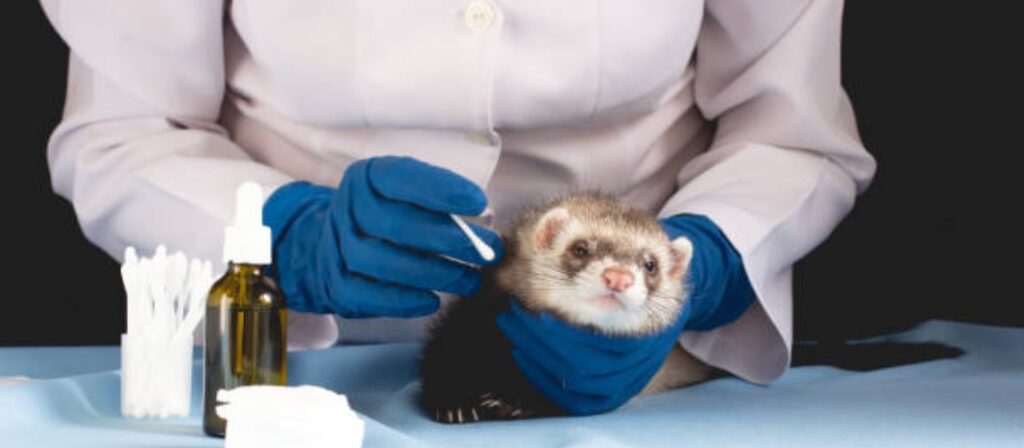
Keeping your ferret healthy is important for their overall well-being. This includes being aware of common health issues, recognizing signs of illness, and scheduling regular check-ups with your veterinarian.
Common Health Issues in Ferrets
Ferrets can be prone to certain health issues such as adrenal disease, insulinoma, and dental problems. Symptoms of these conditions may include hair loss, weight loss, lethargy, and difficulty eating or drinking. If you notice any of these signs, seek veterinary care right away.
Signs of Illness
It’s important to monitor your ferret’s behavior and appearance for signs of illness. These may include changes in appetite, energy level, and bathroom habits, as well as discharge from the nose, eyes, or ears. If you notice any concerning symptoms, contact your veterinarian.
- Loss of appetite or excessive thirst
- Lethargy or lack of energy
- Difficulty breathing or coughing
- Vomiting or diarrhea
- Unusual discharge from the nose, eyes, or ears
- Hair loss or skin problems
- Changes in urination or bowel movements
- Swollen or painful areas on the body
- Signs of discomfort or pain, such as whining or hiding
Regular Vet Check-ups
Regular check-ups with your veterinarian are important for maintaining your ferret’s health. They can perform a physical exam, provide vaccinations, and offer advice on nutrition and care. It’s recommended to schedule a check-up at least once a year, or more frequently if your ferret has a health condition. Ferret – Wikipedia
Exercise and Playtime
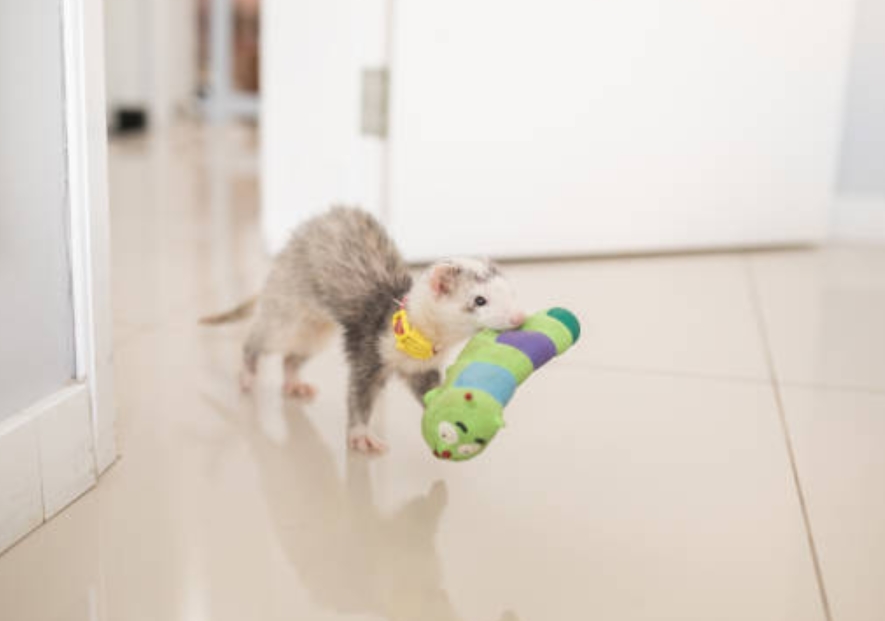
Ferrets are active animals that need regular exercise and playtime to stay healthy and happy. This includes providing them with safe play areas, and toys, and creating a routine for playtime.
Importance of Play for Ferrets: Playtime is important for ferrets as it helps them release energy, prevent boredom, and bond with their owners. They enjoy playing with toys, and tunnels, and exploring new spaces.
Safe Play Areas and Toys
It’s important to create a safe play area for your ferret to avoid injury and ensure their well-being. This can include ferret-proofing your home, using playpens, and providing toys that are safe for them to play with.
Creating a Routine for Playtime
Creating a routine for playtime can help your ferret adjust to a schedule and make sure they get enough exercise and stimulation. This can include scheduling playtime during the morning and evening and providing a variety of toys to keep them engaged.
Socialization and Training
Socialization and training are important for ferrets as it helps them bond with their owners and learn important skills. This includes bonding with your ferret, basic obedience training, and litter box training.
How to Bond with Your Ferret
Bonding with your ferret can be a rewarding experience for both you and your pet. This includes spending quality time with them, offering treats, and providing a safe and comfortable environment.
- Spend quality time with your ferret every day, such as playing with toys or just cuddling with them. This helps them feel more comfortable and connected with you.
- Offer your ferret treats, such as small pieces of cooked chicken or turkey, to create positive associations with you.
- Provide a safe and comfortable environment for your ferret to explore, including plenty of hiding places and toys.
- Talk to your ferret in a calm and soothing voice to help them feel at ease.
- Be patient and understanding with your ferret, as it can take time for them to fully trust and bond with you.
Basic Obedience Training
Basic obedience training can help your ferret learn important skills and behaviors such as responding to their name, coming when called, and walking on a leash. This can include using positive reinforcement, such as treats and praise.
Litter Box Training
Litter box training is important to keep your ferret’s living space clean and healthy. This includes providing a litter box in their cage, using ferret-safe litter, and offering positive reinforcement when they use it correctly.
- Start by choosing a litter box that is large enough for your ferret to move around comfortably.
- Place the litter box in a quiet and accessible area, away from their food and water bowls.
- Fill the litter box with a safe and absorbent litter material, such as paper-based or wood-based pellets.
- Introduce your ferret to the litter box and encourage them to investigate it.
- When your ferret uses the litter box, reward them with a treat and positive reinforcement.
- If your ferret has an accident outside of the litter box, clean it up immediately and place the waste in the litter box to encourage them to use it.
- Consistency is key when litter box training your ferret. Be patient and continue to reinforce positive behavior with treats and praise.
Common Questions and Answers for Ferret Caring

How do you take care of a ferret?
- Ferrets require a proper diet, a clean and spacious cage, grooming, exercise, socialization, and regular check-ups from a veterinarian.
How hard is it to take care of a ferret?
- Taking care of a ferret requires effort and commitment, but it is manageable with proper knowledge and preparation.
How hard are ferrets to take care of?
- Ferrets can be challenging to take care of due to their high energy levels and specific needs, but it can be rewarding with proper care.
Ferret how to take care of?
- To take care of a ferret, you need to provide them with a balanced diet, a comfortable and safe living environment, grooming and hygiene, exercise and playtime, training, and socialization, and regular vet check-ups.
Ferrets how to take care of them?
- Ferrets need a balanced diet, a spacious and clean cage, grooming, playtime and exercise, socialization, training, and regular vet visits.
How to take care of a pet ferret?
- To take care of a pet ferret, you need to provide them with proper food, a safe and comfortable living space, exercise and playtime, grooming, socialization, training, and regular veterinary care.
How to properly take care of a ferret?
- To properly take care of a ferret, you need to meet its specific needs, including a balanced diet, a clean and spacious cage, grooming, exercise and playtime, training, socialization, and regular check-ups from a veterinarian.
How do you take care of ferrets?
- Taking care of ferrets requires providing them with proper nutrition, a comfortable living space, exercise, and playtime, grooming, and hygiene, training, and socialization, and regular vet check-ups.
How to take care of a ferret for beginners?
- Beginner ferret owners should focus on providing their pets with proper nutrition, a clean and safe living space, grooming and hygiene, exercise and playtime, training, socialization, and regular vet visits.
How easy are ferrets to take care of?
- Taking care of ferrets can be challenging due to their high energy levels and specific needs, but it is manageable with proper knowledge and preparation.
How easy is it to take care of a ferret?
- Taking care of a ferret requires effort and commitment, but it can be rewarding and manageable with proper care.
How to take care of a ferret?
- To take care of a ferret, you need to provide them with proper food, a safe and comfortable living space, exercise and playtime, grooming and hygiene, training and socialization, and regular veterinary care.
How to take care of ferrets at home?
- To take care of ferrets at home, you need to provide them with a proper diet, a clean and spacious cage, grooming and hygiene, exercise and playtime, training, and socialization, and regular vet visits.
How to take care of your ferret?
- To take care of your ferret, you need to meet its specific needs, including a balanced diet, a clean and comfortable living space, grooming, and hygiene, exercise, and playtime, training and socialization, and regular vet check-ups.
All about ferrets and how to take care of them?
- Ferrets are fun and energetic pets that require a balanced diet, a safe and clean living space, grooming and hygiene, exercise, and playtime, training and socialization, and regular vet check-ups for proper care.
Conclusion of How to Take Care of a Ferret
Recap of the essential tips for taking care of a ferret
- Ferret Housing: choose a suitable cage, set it up properly, and provide bedding and toys.
- Feeding Your Ferret: understand their dietary needs, select the right food, and establish a feeding schedule with appropriate portion sizes.
- Grooming and Hygiene: bathe your ferret, trim its nails, and clean its ears regularly.
- Health and Wellness: be aware of common health issues and signs of illness, and schedule regular check-ups with a vet.
- Exercise and Playtime: prioritize playtime, provide safe play areas and toys, and create a routine.
- Socialization and Training: bond with your ferret, provide basic obedience training, and train them to use a litter box.
Final thoughts on being a responsible ferret owner
In summary, being a responsible ferret owner requires commitment and dedication. You must ensure that your ferret’s basic needs are met, including their housing, diet, grooming, exercise, and health. You should also take the time to bond with your ferret, provide them with a safe and stimulating environment, and seek veterinary care when necessary. With proper care, your ferret can be a loving and rewarding companion for years to come.
In conclusion, as we conclude this guide on how to take care of a ferret, we hope that you have learned the essential tips for being a responsible ferret owner. Remember that ferrets require a lot of attention, time, and patience, but they can bring endless joy and entertainment to your life. By providing them with a safe and healthy environment, a balanced diet, regular grooming and exercise, and proper socialization and training, you can ensure a happy and fulfilling life for your ferret companion. Always stay informed and consult with a veterinarian if you have any concerns or questions about your ferret’s health and well-being.
Ferret lovers need to know, Why Do Ferrets Stink: Effective Odor-Free Management for Ferrets
Dear readers, We hope that this guide on how to take care of a ferret has been helpful to you. We would love to hear about your own experiences and journey with your pet ferret. Feel free to leave a comment and share your insights on this post. Let’s build a community of responsible ferret owners who can support and learn from each other.
